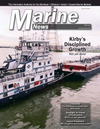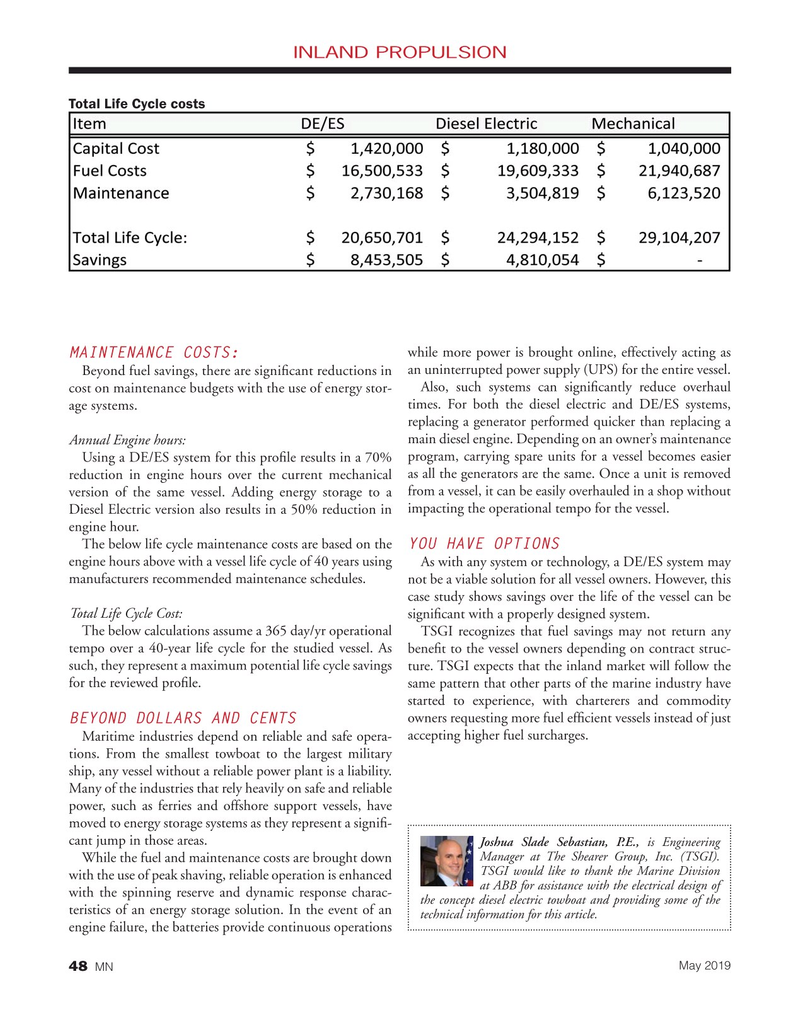
Page 48: of Marine News Magazine (May 2019)
Inland Waterways
Read this page in Pdf, Flash or Html5 edition of May 2019 Marine News Magazine
INLAND PROPULSION
Total Life Cycle costs while more power is brought online, effectively acting as
MAINTENANCE COSTS:
Beyond fuel savings, there are signi? cant reductions in an uninterrupted power supply (UPS) for the entire vessel.
cost on maintenance budgets with the use of energy stor- Also, such systems can signi? cantly reduce overhaul age systems. times. For both the diesel electric and DE/ES systems, replacing a generator performed quicker than replacing a
Annual Engine hours: main diesel engine. Depending on an owner’s maintenance
Using a DE/ES system for this pro? le results in a 70% program, carrying spare units for a vessel becomes easier reduction in engine hours over the current mechanical as all the generators are the same. Once a unit is removed version of the same vessel. Adding energy storage to a from a vessel, it can be easily overhauled in a shop without
Diesel Electric version also results in a 50% reduction in impacting the operational tempo for the vessel. engine hour.
The below life cycle maintenance costs are based on the
YOU HAVE OPTIONS engine hours above with a vessel life cycle of 40 years using As with any system or technology, a DE/ES system may manufacturers recommended maintenance schedules. not be a viable solution for all vessel owners. However, this case study shows savings over the life of the vessel can be
Total Life Cycle Cost: signi? cant with a properly designed system.
The below calculations assume a 365 day/yr operational TSGI recognizes that fuel savings may not return any tempo over a 40-year life cycle for the studied vessel. As bene? t to the vessel owners depending on contract struc- such, they represent a maximum potential life cycle savings ture. TSGI expects that the inland market will follow the for the reviewed pro? le. same pattern that other parts of the marine industry have started to experience, with charterers and commodity owners requesting more fuel ef? cient vessels instead of just
BEYOND DOLLARS AND CENTS
Maritime industries depend on reliable and safe opera- accepting higher fuel surcharges. tions. From the smallest towboat to the largest military ship, any vessel without a reliable power plant is a liability.
Many of the industries that rely heavily on safe and reliable power, such as ferries and offshore support vessels, have moved to energy storage systems as they represent a signi? - cant jump in those areas.
Joshua Slade Sebastian, P.E., is Engineering
Manager at The Shearer Group, Inc. (TSGI).
While the fuel and maintenance costs are brought down
TSGI would like to thank the Marine Division with the use of peak shaving, reliable operation is enhanced at ABB for assistance with the electrical design of with the spinning reserve and dynamic response charac- the concept diesel electric towboat and providing some of the teristics of an energy storage solution. In the event of an technical information for this article. engine failure, the batteries provide continuous operations
May 2019 MN 48

 47
47

 49
49
